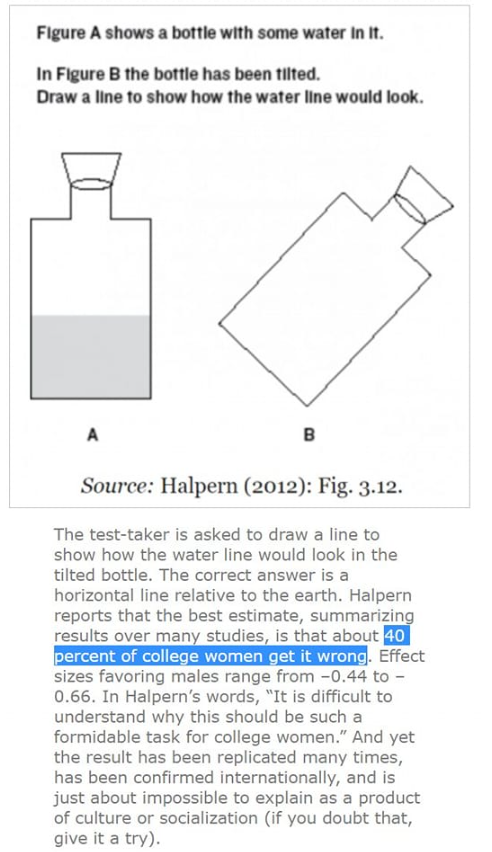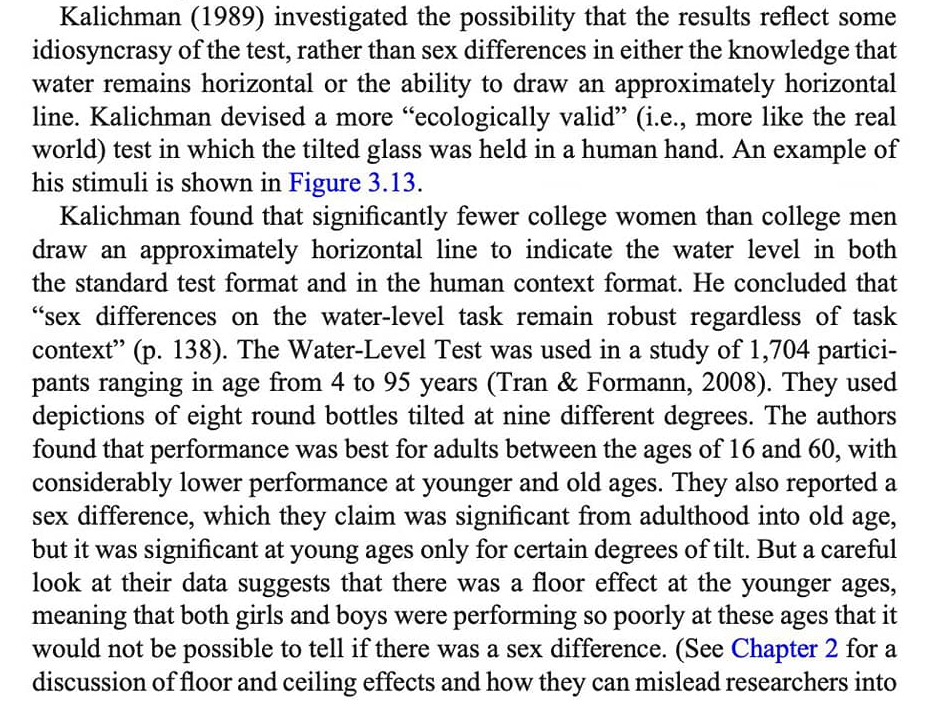Water-level task: Difference between revisions
No edit summary |
No edit summary |
||
| (9 intermediate revisions by the same user not shown) | |||
| Line 1: | Line 1: | ||
[[File:Water level task.png|thumb|An excerpt from Halpern, Diane F. (2012). Sex differences in cognitive abilities (4th ed.). New York: Psychology Press]] |
|||
| ⚫ | |||
| ⚫ | |||
The experiment attempts to assess the subject's reasoning ability in spatial relations. To do so the subject is shown pictures depicting various shaped bottles with a water level marked, then shown pictures of the bottles tilted on different angles without the level marked, and the subject is asked to mark where the water level would be. |
The experiment attempts to assess the subject's reasoning ability in spatial relations. To do so the subject is shown pictures depicting various shaped bottles with a water level marked, then shown pictures of the bottles tilted on different angles without the level marked, and the subject is asked to mark where the water level would be. |
||
| Line 5: | Line 7: | ||
== Sex Differences == |
== Sex Differences == |
||
The water |
The water-level task has been of interest to psychologists due to a significant sex difference in performance of the task. Multiple studies have indicated that female participants fail the task at a significantly higher rate than male participants.<ref>https://en.wikipedia.org/w/index.php?title=Water-level_task&oldid=1061920218</ref> |
||
[[File:Water level test 2.png|thumb|Another excerpt from Halpern, Diane F. (2012). Sex differences in cognitive abilities (4th ed.). New York: Psychology Press]] |
|||
{{wikipedia}} |
{{wikipedia}} |
||
| Line 12: | Line 16: | ||
[[Category: Featured Articles]] |
[[Category: Featured Articles]] |
||
[[Category: |
[[Category: Science]] |
||
[[Category: Sex Differences]] |
|||
[[Category: Wikipedia]] |
[[Category: Wikipedia]] |
||
Latest revision as of 11:30, 25 December 2022

The water-level task is an experiment in developmental psychology and cognitive psychology[1][2]
The experiment attempts to assess the subject's reasoning ability in spatial relations. To do so the subject is shown pictures depicting various shaped bottles with a water level marked, then shown pictures of the bottles tilted on different angles without the level marked, and the subject is asked to mark where the water level would be.
Sex Differences
The water-level task has been of interest to psychologists due to a significant sex difference in performance of the task. Multiple studies have indicated that female participants fail the task at a significantly higher rate than male participants.[3]

Wikipedia
This article contains information imported from the English Wikipedia. In most cases the page history will have details. If you need information on the importation and have difficulty obtaining it please contact the site administrators.
Wikipedia shows a strong woke bias. Text copied over from Wikipedia can be corrected and improved.